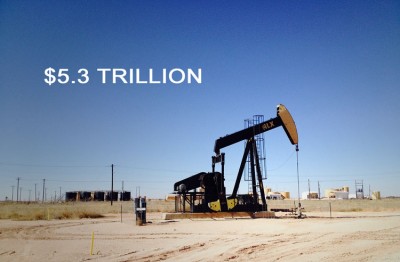 A recent paper released by the International Monetary Fund (IMF) should shock all of us who believe in a green future based on renewable energy. Despite stark warnings from scientists, fossil fuel subsidies continue to grow: this year alone, it is estimated that dirty coal and energy corporations will receive a staggering $5.3 trillion from governments worldwide.
A recent paper released by the International Monetary Fund (IMF) should shock all of us who believe in a green future based on renewable energy. Despite stark warnings from scientists, fossil fuel subsidies continue to grow: this year alone, it is estimated that dirty coal and energy corporations will receive a staggering $5.3 trillion from governments worldwide.
To put this into perspective, the sum is more than the healthcare budget of all the countries in the world combined. It works out at $600 million per hour, $10 million per minute, and $200,000 per second. Just imagine what we could do with that kind of money. We could eradicate poverty, invest in clean energy, boost health and education systems, start a food revolution, and create more jobs in these industries as a result. Instead of the logical option, our governments choose to spend our tax dollars on propping up the same corporations that are poisoning us and the planet (while making ridiculously huge profits at the same time).
If you’re a US taxpayer, you should be doubly pissed about this news. Whether you know it or not, you are helping the likes of ExxonMobil, Shell, and Marathon Petroleum- and not just when you fill up at the pump. In 2014 alone, US taxpayers subsidized fossil fuel exploration and production by $21 billion. Think that’s bad? This year the sum will be an estimated $700 billion.
In addition to all this lunacy, a separate investigation by the Guardian newspaper in London has highlighted the trail of dirty money connecting these enormous subsidies and political sponsorship. They report:
- Shell made an annual profit of $26.8bn in 2012, and yet that very same year it won a deal to receive $1.6bn more in taxpayer’s money for its Pennsylvania refinery over the next few years.
- ExxonMobil is set to receive $119m for its Baton Rouge plant according to a deal signed in 2011, even though the corporation made a staggering $41bn profit that year.
- In 2011, Marathon Petroleum made $2.4bn, but still needed more to keep ticking along, so a jobs subsidy scheme in Ohio subsidized the corp by $78m.
“Big oil, gas, and coal have huge influence on politicians and governments and they get that influence the old fashioned way: they buy it,” Stephen Kretzmann, executive director of Oil Change International, told the Guardian last month.
“Through campaign finance, lobbying, advertising and superpac spending, the industry has many ways to influence candidates and government officials seeking re-election.” Kretzmann added: “Every single well, pipeline, refinery, coal and gas plant in the country is heavily subsidized. Big Fossil’s lobbyists have done their jobs well for the last century.”
The IMF don’t say much about that, but the paper explains this blatant hijacking of public funds with some irrelevant technicalities: ‘The projected gains for 2015 are about $2.9 trillion (3.6 percent of global GDP). The revenue gain is quite a lot lower than the post-tax energy subsidy, as it accounts for the price-induced reduction in energy use and implicitly assumes tax rebates are used to promote adoption of emission control technologies for coal, which lowers net revenue.’
Clearly, fossil fuel energy prices are well below levels that reflect their true costs. Nicholas Stern, a climate economist at the London School of Economics, told the Guardian in May: “There is no justification for these enormous subsidies for fossil fuels, which distort markets and damages economies, particularly in poorer countries.” Stern also voiced concerns that the IMF estimate was actually much lower than the real figures, saying that it hadn’t accounted for “implicit”, or hidden, subsidies.
The $5.3 trillion figure given accounts for 6.5% of the global GDP; just over half the figure is the money governments are forced to spend treating the victims of air pollution and the income lost because of ill health and premature deaths caused by dirty energy. Coal is the dirtiest fuel in terms of both local air pollution and climate-warming carbon emissions and is therefore gets the most subsidies, with just over half the total amount. Oil, heavily used in transport, gets about a third of the subsidy, and gas the rest. Subsidies are also used to fund exploration for more oil- a great example of humanity’s madness, greed, and disconnection with nature.
In April, the president of the World Bank called for the subsidies to be scrapped immediately as poorer nations were feeling “the boot of climate change on their neck”. Even the IMF itself appeared to be shocked over the latest estimates for 2015. They called the number “shocking”, acknowledging the estimate was accurate and “extremely robust”. The IMF has previously stated that ending subsidies for fossil fuels would cut global carbon emissions by 20%, so why haven’t world leaders committed to this yet?
“Climate science is clear that the vast majority of existing reserves will have to stay in the ground,” Kretzmann said. “Yet our government spends many tens of billions of our tax dollars – every year – making it more profitable for the fossil fuel industry to produce more.”
The authors of the paper claim that ending dirty energy subsidies, we would prevent 1.6 million (50%) of deaths by air pollution, reduce poverty and increase economic growth by investing in health and education and cutting taxes.However, the reforms they recommend involve increased energy taxation for regular people (and they also suggest that if these changes are pushed through now, we are less likely to make any noise about it):
‘Low international energy prices provide a window of opportunity for countries to eliminate pre-tax subsidies and raise energy taxes as the public opposition to reform is likely to be somewhat more muted.’
Maybe instead of hiking the prices at the pump, we could hike corporate taxes instead? Maybe we could choose to keep the oil in the ground (see the Guardian campaign), and divert energy subsidies from fossil fuels to wind, solar and tidal power. Sadly, global investment in green energy has been falling since 2011; in 2013, the figure for renewable energy was a relatively small $214 billion.
Senator Bernie Sanders announced in April he will be running in the next US presidential elections, and has proposed an End Polluter Welfare Act, which he says would cut $135bn of US subsidies for fossil fuel companies over the next decade.
Sanders spoke out against the corruption: “At a time when scientists tell us we need to reduce carbon pollution to prevent catastrophic climate change, it is absurd to provide massive taxpayer subsidies that pad fossil-fuel companies’ already enormous profits.”
This article (Shock Report: Your Taxes Subsidize Dirty Oil Corporations By $5.3 TRILLION) is free and open source. You have permission to republish this article under a Creative Commons license with attribution to the author and TrueActivist.com.


